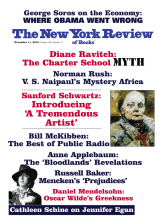In response to:
Lords of 'Pride and Plunder' from the June 24, 2010 issue
To the Editors:
Robert Bartlett well sees that my book The Crisis of the Twelfth Century is about lordship [“Lords of ‘Pride and Plunder,'” NYR, June 24]. But he challenges my contention that medieval lordship, as we know it from the sources, was not normally the same thing as government.
He is right about the genealogy of this book, and he rightly identifies some of the historical questions it raises. I avow my descent from historians Charles Homer Haskins and Joseph R. Strayer (while disavowing any claim to parity with them). My purpose is, indeed, to explore problematic issues relating to power in the twelfth century, issues of interest to modernity as well as a famous remote past. But by failing to recognize that my history of power and lordship breaks sharply with an old historiography of medieval government (and so shielding me from the charge of infidelity), Bartlett comes close to misrepresenting my book as consensus history marred by provocative lapses.
What I must say is that his whole review looks like the defense of a scholarly consensus I no longer share: namely, that the lordships of the twelfth century were simply the passing expression of an abiding reality of government and politics. If lordship is the normal mode of power in twelfth-century Europe, then one task of research must be to learn how such power, sociologically and culturally, is related to the “government” that literally fills our books on medieval history. Bartlett worries that my usage “lord-king” (“lord-prince,” etc.) is, in his words, “far from standard,” which in one sense is quite true. What he neglects to add is that this usage is absolutely standard in the primary sources. The reviewer reaches for safer ground when he questions my sense that “government,” when it appears at all in the twelfth century, looks socially purposive and rational. Do not modern governments often fail such a test? Yet the implied analogy is false. Reason and justice are norms of government in the modern world, however perverted they may be in practice, associated with official and public authority. They were little more than ideals in the ponderously lorded twelfth century.
My distinction between lordly and “political” behavior follows from this distinction. Bartlett’s thrust is as follows: “Might it not be clearer to say that the politics of that time was not the same as the politics of ours?” My answer is emphatically NO. If we continue to treat all power as political, as do virtually all medievalists, we renounce hope of characterizing power historically, of grasping how differently it worked in the Investiture Conflict and the crisis of Magna Carta.
My concept of a twelfth century in crisis may seem vulnerable on its face—are not all centuries in crisis?—yet it is rooted in the sources. Consensus history lacks “crises” here, let alone Big Crisis, so in Bartlett’s terms all I have done is to give the twelfth century its due. And there is nothing in prevailing research to counter my argument that multiplied knights and castles were the deep cause of a prolonged structural confrontation of powers in that age.
Thomas N. Bisson
Emeritus Lea Professor of Medieval History
Harvard University
Cambridge, Massachusetts
This Issue
November 11, 2010



